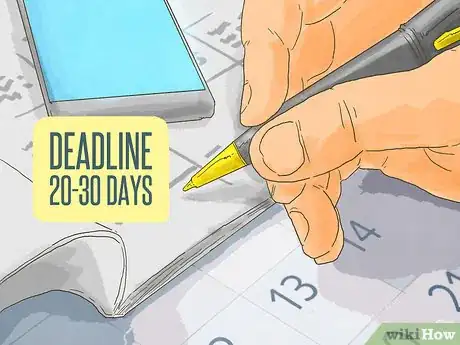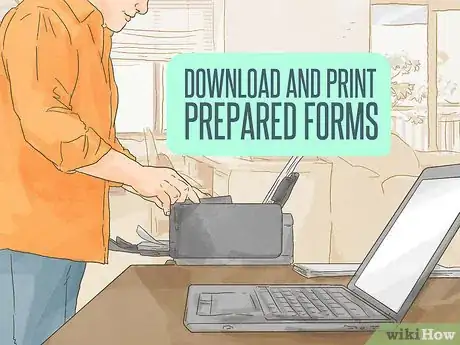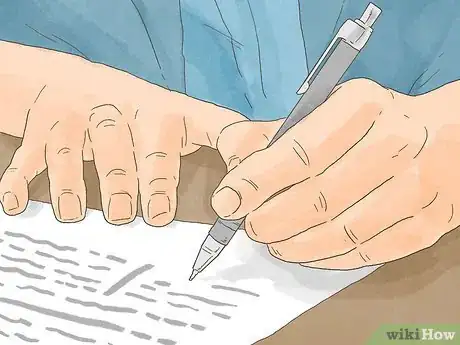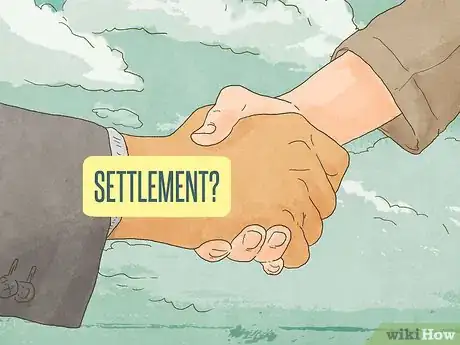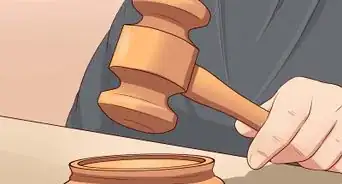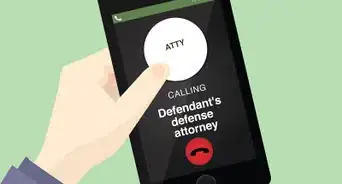This article was written by Jennifer Mueller, JD. Jennifer Mueller is an in-house legal expert at wikiHow. Jennifer reviews, fact-checks, and evaluates wikiHow's legal content to ensure thoroughness and accuracy. She received her JD from Indiana University Maurer School of Law in 2006.
There are 8 references cited in this article, which can be found at the bottom of the page.
This article has been viewed 34,564 times.
Being served with a summons and complaint by a sheriff's deputy can be a frightening experience. Even if you had a general expectation that someone was planning to sue you, actually getting the papers can still be a shock. When you're served with a complaint, you have a limited time – usually less than a month – to get information together and file a response, or you may lose your case by default. Although specific procedures will vary among jurisdictions, the basic process to answer a civil lawsuit is generally the same.[1]
Steps
Evaluating Your Options
-
1Read the complaint. When you are served, make sure you read the complaint carefully so you understand the allegations and why you are being sued.
- Write down any laws that are cited, as you will want to look them up so you understand what they cover.
- Check to make sure your name and address are correctly entered in the complaint.
-
2Make note of the deadline. You will have a deadline to respond to the complaint, typically 20 or 30 days from the date you are served.[2] [3]
- Keep in mind that this deadline typically is measured by calendar days – not just days the court is in session. So make sure you're counting weekends and holidays when you determine how long you have to respond.[4]
- The deadline should be included on your summons, which also includes other information such as the date the hearing is scheduled.[5] [6]
- The summons also will include the plaintiff's information, so you know where to send a copy of your answer once it's filed.[7]
Advertisement -
3Contact the clerk of court. Before you begin drafting your answer, you may want to call the clerk's office and find out the court's basic procedures first.
- The clerk will be able to tell you what forms you must file, and when. For example, some jurisdictions require you to file a notice of appearance if you are representing yourself, before you file your answer.[8]
-
4Gather information. Once you know what the lawsuit is about, related documents or other evidence you have in your possession can help you decide how you want to respond.
- For example, if you are being sued because you owe someone money, you might want to find any written contracts or agreements you have. Check the amounts stated in the complaint against the amounts on your statements and make sure they match.
- Look at each allegation in the complaint individually, and determine whether you have any documents or other evidence that either proves or disproves that allegation. Pull all those things together – although you won't need them to file your answer, you will need them as the case progresses.
-
5Research the law. Check any law cited in the complaint as well as related laws to determine if you have any defenses available.
- Since you have a limited time to file your answer, you may not be able to do extensive research and legal analysis – but that's not really necessary at this stage. All you need is a basic understanding of why you're being sued and what law gives the plaintiff the right to sue you.
- You typically can find copies of your state's law online, on the websites for either your state court's system or your state's legislature. You also may want to look on the websites of legal aid and legal self-help programs in your area, as they often have summaries and plain language descriptions of state law.
- Through your research you also should uncover defenses you might be able to raise. If you so much as suspect that a defense might apply in your case, you'll want to go ahead and raise it in your answer. You'll have time to research it more thoroughly later.[9]
- When you find the law that covers the plaintiff's claim, compare the allegations in the complaint to the elements in the law, and make sure they match exactly. If he or she has failed to include all the required elements, you may be able to file a motion to have the complaint dismissed.
- For example, if the lawsuit alleges you breached a contract, the plaintiff must allege that the two of you had a contract; that they fulfilled their side of the bargain, but that you failed to do all or part of what you were obligated to do under the contract; and they incurred damages as a result. If one of those elements is missing, the plaintiff has "failed to state a claim."[10]
-
6Consider consulting an attorney. If the lawsuit is complex or involves a significant amount of money, it may be in your best interests to work with an attorney.
- If you draft and file your answer without talking to an attorney, you could accidentally give up rights that you didn't intend to lose, such as the ability to raise certain defenses. Although an attorney can be expensive, consider that cost against the cost of losing the case.
- You may have an affirmative defense, which essentially means you did what the plaintiff alleges you did, but that you had a good reason or excuse for it. That excuse means you are not legally liable for the plaintiff's damages. Self defense is one affirmative defense with which most people are familiar, and is used in both civil and criminal law.
- Affirmative defenses shift the burden of proof so that you, instead of the plaintiff, must show the court why you should not be held legally liable for the plaintiff's damages or losses. If you're thinking about raising such a defense, the advice of an attorney can be invaluable in assuring that you can prove all the required elements of the defense.
- Most attorneys will give you a free initial consultation, but keep in mind that they do have busy schedules. If you want to talk to an attorney before you file your answer, you should do so as soon as possible after you're served with the complaint.[11]
- If you're worried about the cost of hiring an attorney, you might check with your local legal aid office or law school clinics and see if you qualify for free or reduced-cost representation. Your local bar association also might have referral programs you can use.[12]
- Some attorneys also offer unbundled services, in which they consult with you on some aspects of the case or assist in document preparation, but don't actually represent you in court. This sort of assistance can be more cost-effective and ensure that your rights are preserved.
Drafting Your Answer
-
1Search for forms. Many courts have forms available for answering a civil lawsuit that are pre-approved by the state's judicial system.
- You generally can find forms on the court's website or in the clerk's office. Forms also may be available at your local legal aid or law school clinic, or at the public law library in the courthouse.[13]
- Legal aid offices also may have copies of sample forms or answers that you can use as guides to help you understand the required legal language and the way the rules of civil procedure work.[14]
-
2Format your answer. If you can't find a prepared form to use, you must format your answer by hand using other documents filed in the same court as guides.
- Your state's code of civil procedure will state what must be included in an answer, and provide general rules on how your answer must be worded.[15]
- Local rules provide more specifics on how a specific court wants documents formatted that are filed with that court.
- Generally, you will need to type your answer, or print it neatly using black ink. You also can look at the complaint for information such as the case name and number, which must be included on your answer as well.[16]
- You can use the first page of the complaint as a guide for how the first page of your answer should look.[17]
- Copy the heading or caption of the lawsuit exactly as it appears on the complaint.[18]
- The first line of your answer should read something like "In response to Plaintiff's complaint, Defendant responds as follows." Then you're ready to deal with the allegations of the complaint.[19]
-
3Respond to the allegations in the complaint. Typically you must respond to each numbered paragraph and state whether you admit, deny, or have insufficient knowledge to admit or deny the allegation.
- There are different ways you can answer the lawsuit, and which you choose will depend on the allegations in the complaint and whether you agree with them.[20]
- Type your responses in numbered paragraphs that correspond to the plaintiff's numbers, then reference the number in your statement. For example, you might write "In response to paragraph one of Plaintiff's complaint, Defendant denies the allegations contained therein."[21]
- Use the same language for each paragraph, substituting the verb "denies" as appropriate if you want to admit the allegation. If you don't know anything about the allegation, you can write "Defendant has insufficient knowledge or information to either admit or deny the allegation."[22]
- You can provide a general denial if you wish to deny all allegations in the complaint.[23] While this is a quick and easy way to respond, it may not always be accurate. For example, if the first allegations in the complaint identify you, your address, and other information about your identity, it may not be appropriate for you to deny those allegations if they are factually correct.
- Other types of answers might come into play based on your analysis of the complaint and your reading of the law. For example, you might respond with a demurrer, which means that even if everything in the complaint is true, it's still not a legal reason for you to be held responsible for the plaintiff's damages or losses.[24]
- Be careful when responding with a demurrer, because it involves essentially admitting that the allegations in the complaint are true. If the judge disagrees with you that those allegations don't add up to a legal cause of action, you could find yourself losing the case.[25]
- Don't guess or assume that an allegation is correct just because it's listed in the complaint. If you don't have enough information to confirm whether the allegation is true, say so.[26]
- Keep in mind that if you deny an allegation, it doesn't mean you're saying it's not true. Rather, you are forcing the plaintiff to present evidence to prove in court that it's true. The plaintiff has the burden of proof in a civil case, so all you're doing by denying an allegation is insisting that the plaintiff carry his or her burden.[27]
-
4Raise any applicable defenses or counterclaims. If your research has uncovered any defenses available to you, or if you have a counterclaim against the person suing you related to the same dispute, you must include these in your answer.[28]
- Your state rules of civil procedure state which defenses must be raised in your answer, and which can be raised at a later date. Some defenses, such as lack of jurisdiction, must be raised in your defense or the court will treat it as though you'd waived any defense or objection you might have had to that issue.[29]
- When you raise a defense in your answer, you don't have to prove it – you're simply stating that you believe it might apply. You can write something like "Defendant alleges Plaintiff is not entitled to recover damages based on the following defenses."[30] [31]
- Keep in mind that just because you raise a defense in your answer, you aren't committing to arguing it later. Sometimes attorneys will raise defenses in an answer simply to preserve them in case they want to use them later. After you learn more about the case, you may decide that a defense you raised in the answer no longer applies, but raising it in the answer means you won't risk losing the ability to argue it later.[32]
- You also may wish to file motions, such as a motion to dismiss, as applicable to the case. If you think a motion may be appropriate, it's advisable to get an attorney's opinion before you proceed.[33]
-
5Sign your answer. Once you're satisfied that all of the information in your answer is true and complete to the best of your knowledge, you're ready to finalize it for filing.
- If you're drafting your answer by hand, skip down a few lines and make a blank line for your signature, then type your name and contact information below it.
- After you've signed your answer, make at least two copies. You'll need one for your own records and one for the plaintiff – the court will keep the originals.[34]
- Depending on the subject matter of the plaintiff's lawsuit, there may be other forms you need to file with your answer, such as declarations or affidavits. The summons should tell you what documents you need, or you can find out when you call the clerk's office.[35]
Filing Your Answer
-
1Take your paperwork to the clerk's office. You must file your answer in the same court where the plaintiff filed his or her complaint.
- Keep in mind that if you don't file your answer by the deadline given for you to respond, the court will assume that you agree with all of the allegations in the complaint and may enter a default judgment against you.[36]
- Bring your originals as well as the two copies you made so the clerk can stamp all of them as "filed." The clerk will give you the copies back.[37]
- In most jurisdictions you don't have to pay any filing fees to file your answer. However, you may have to pay filing fees if you're also filing a motion or a counterclaim.
-
2Have the plaintiff served. The plaintiff must receive legal notice of your answer to his or her complaint.
- You typically can serve your answer by mailing it to the plaintiff at the address shown on your summons using certified mail with returned receipt requested.[38]
- The return receipt card tells you when the plaintiff received your answer and is acceptable by the courts as proof of service.[39]
- In some jurisdictions you can mail your answer to the plaintiff before you file it with the court. The clerk will be able to tell you whether you have this option.[40]
-
3Make a settlement offer. If the plaintiff hasn't already sent you a demand, you might consider extending a settlement offer to resolve the dispute.
- Keep in mind that most civil lawsuits are resolved before they ever get to trial. Typically you can reach a settlement, and due to the time and expense of a lawsuit it's probably in the best interests of both parties.[41]
- Settlements can be beneficial to both sides, since you both are spared the time, stress, and costs of litigating a case and going to trial.[42]
- If the plaintiff has already sent a settlement demand, you can start your negotiations there. Don't treat his or her offer as an all-or-nothing proposition – most of the time, people are willing to compromise once the time and expense of going to trial is considered.
-
4Participate in mediation. Some jurisdictions mandate that parties attempt mediation before a civil trial can be scheduled.
- Through mediation, a neutral third party works with you and the plaintiff to attempt to reach a compromise in your dispute. The process is simple, non-confrontational, and relatively informal.[43]
- In many jurisdictions, mediation is offered free of charge by the court system. It has a benefit over a trial in that the proceedings are confidential, so unlike court there will be no public record. Additionally, you have much greater control over the outcome than you would if you went to trial and your fate was decided by a judge or jury.[44]
- Courts also may schedule pre-trial hearings or conferences in which a judge will sit down with you and the plaintiff and work with you to find a possible settlement to the suit. If you cannot agree upon a settlement, the judge will schedule the trial in the matter.[45]
References
- ↑ http://www.scscourt.org/self_help/civil/lawsuits/defendant.shtml
- ↑ http://www.scscourt.org/self_help/civil/lawsuits/defendant.shtml
- ↑ http://www.washingtonlawhelp.org/resource/how-to-answer-a-lawsuit-for-debt-collection
- ↑ http://www.scscourt.org/self_help/civil/lawsuits/defendant.shtml
- ↑ http://www.washingtonlawhelp.org/resource/how-to-answer-a-lawsuit-for-debt-collection
- ↑ https://www.ohiobar.org/forpublic/resources/lawyoucanuse/pages/lawyoucanuse-670.aspx
- ↑ https://www.ohiobar.org/forpublic/resources/lawyoucanuse/pages/lawyoucanuse-670.aspx
- ↑ http://www.washingtonlawhelp.org/resource/how-to-answer-a-lawsuit-for-debt-collection
- ↑ https://www.ohiobar.org/forpublic/resources/lawyoucanuse/pages/lawyoucanuse-670.aspx
- ↑ http://www.nolo.com/legal-encyclopedia/when-should-you-sue-29900.html
- ↑ https://www.ohiobar.org/forpublic/resources/lawyoucanuse/pages/lawyoucanuse-670.aspx
- ↑ https://www.ohiobar.org/forpublic/resources/lawyoucanuse/pages/lawyoucanuse-670.aspx
- ↑ http://www.scscourt.org/self_help/civil/lawsuits/defendant.shtml
- ↑ http://www.washingtonlawhelp.org/resource/how-to-answer-a-lawsuit-for-debt-collection
- ↑ http://www.scscourt.org/self_help/civil/lawsuits/defendant.shtml
- ↑ http://www.washingtonlawhelp.org/resource/how-to-answer-a-lawsuit-for-debt-collection
- ↑ https://www.ohiobar.org/forpublic/resources/lawyoucanuse/pages/lawyoucanuse-670.aspx
- ↑ http://skibalaw.com/how-to-draft-an-answer-to-a-debt-collection-lawsuit-in-3-steps/
- ↑ http://skibalaw.com/how-to-draft-an-answer-to-a-debt-collection-lawsuit-in-3-steps/
- ↑ http://www.scscourt.org/self_help/civil/lawsuits/defendant.shtml
- ↑ http://skibalaw.com/how-to-draft-an-answer-to-a-debt-collection-lawsuit-in-3-steps/
- ↑ http://skibalaw.com/how-to-draft-an-answer-to-a-debt-collection-lawsuit-in-3-steps/
- ↑ http://www.scscourt.org/self_help/civil/lawsuits/defendant.shtml
- ↑ http://www.scscourt.org/self_help/civil/lawsuits/defendant.shtml
- ↑ http://www.scscourt.org/self_help/civil/lawsuits/defendant.shtml
- ↑ http://www.washingtonlawhelp.org/resource/how-to-answer-a-lawsuit-for-debt-collection
- ↑ http://www.washingtonlawhelp.org/resource/how-to-answer-a-lawsuit-for-debt-collection
- ↑ https://www.ohiobar.org/forpublic/resources/lawyoucanuse/pages/lawyoucanuse-670.aspx
- ↑ http://www.scscourt.org/self_help/civil/lawsuits/defendant.shtml
- ↑ https://www.ohiobar.org/forpublic/resources/lawyoucanuse/pages/lawyoucanuse-670.aspx
- ↑ http://saclaw.org/wp-content/uploads/sbs-answer-contract.pdf
- ↑ https://www.ohiobar.org/forpublic/resources/lawyoucanuse/pages/lawyoucanuse-670.aspx
- ↑ http://www.scscourt.org/self_help/civil/lawsuits/defendant.shtml
- ↑ http://www.washingtonlawhelp.org/resource/how-to-answer-a-lawsuit-for-debt-collection
- ↑ http://www.washingtonlawhelp.org/resource/how-to-answer-a-lawsuit-for-debt-collection
- ↑ http://www.washingtonlawhelp.org/resource/how-to-answer-a-lawsuit-for-debt-collection
- ↑ http://www.washingtonlawhelp.org/resource/how-to-answer-a-lawsuit-for-debt-collection
- ↑ https://www.ohiobar.org/forpublic/resources/lawyoucanuse/pages/lawyoucanuse-670.aspx
- ↑ https://www.ohiobar.org/forpublic/resources/lawyoucanuse/pages/lawyoucanuse-670.aspx
- ↑ https://www.ohiobar.org/forpublic/resources/lawyoucanuse/pages/lawyoucanuse-670.aspx
- ↑ http://injury.findlaw.com/accident-injury-law/resolution-before-trial-settlement.html
- ↑ http://injury.findlaw.com/accident-injury-law/resolution-before-trial-settlement.html
- ↑ https://www.nycourts.gov/courts/nyc/civil/pdfs/mediation.pdf
- ↑ https://www.nycourts.gov/courts/nyc/civil/pdfs/mediation.pdf
- ↑ https://www.ohiobar.org/forpublic/resources/lawyoucanuse/pages/lawyoucanuse-670.aspx

